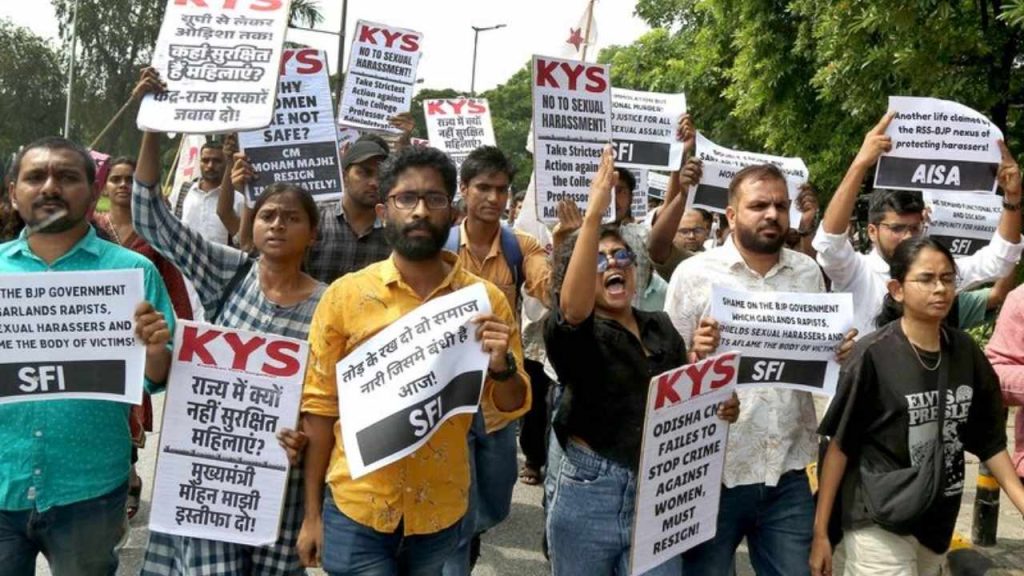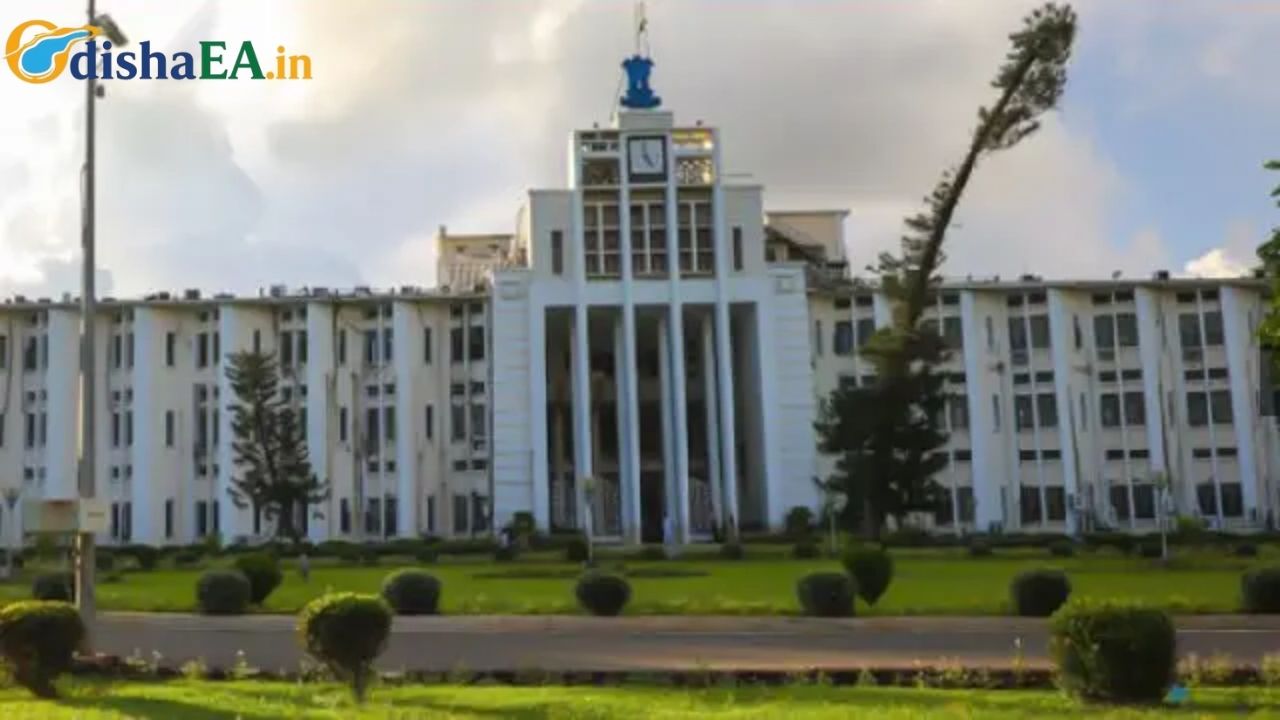In the heart of New Delhi, on July 17, 2025, a group of Jawaharlal Nehru University (JNU) students sparked a heated protest outside Odisha Bhawan, demanding justice for a tragic incident in Odisha. The protest was centered around the death of a 20-year-old student who allegedly self-immolated after being denied justice in a sexual harassment case. In response to the protest, Delhi Police registered an FIR (First Information Report) against several students, including former JNUSU president Aishe Ghosh. This incident has garnered significant attention, raising questions about students’ rights to protest, the state’s response, and the broader implications for activism in India.

Delhi Police Register FIR Against JNU Students
| Topic | Details |
|---|---|
| Date of Incident | July 17, 2025 |
| Location | Odisha Bhawan, New Delhi |
| Protest Trigger | Death of a 20-year-old student from Odisha, self-immolation after alleged sexual harassment case denial |
| Key Individuals | Aishe Ghosh, former JNUSU president, and other JNU students |
| Charges in FIR | Disobedience to public orders (BNS Sections 223(a) and 3(5)) |
| Number of Protesters Detained | 50 to 60 students |
| Police Response | Detainment of protesters using “appropriate force” |
| Official Response | Odisha government under scrutiny for alleged inaction |
| Source | The Tribune, The New Indian Express |
| Related Debate | Right to dissent, student activism, police action |
The protest outside Odisha Bhawan represents much more than a simple act of civil disobedience. It is part of a larger conversation about students’ rights, political accountability, and the role of protests in shaping democratic societies. As the incident unfolds, it will likely continue to fuel debates about the state’s response to activism and how the legal system handles such protests.
The FIR against the JNU students has sparked a wave of questions about freedom of speech, the right to dissent, and the ability of young people to stand up for what they believe in. While the outcome of this particular protest may be unclear, one thing is certain: the students’ call for justice and accountability is far from over.
The Incident That Sparked the Protest
The death of a young student from Balasore, Odisha, ignited widespread outrage across the country. The student allegedly took his own life after a prolonged struggle with the legal system, which failed to provide adequate justice after he filed a complaint of sexual harassment. The incident deeply affected the student community, particularly in Odisha, where the government has been accused of failing to take meaningful action. The tragic death highlighted what many see as systemic issues of indifference towards victims of harassment, especially in cases where powerful political forces seem to protect the perpetrators.
In response to this, students from various educational institutions, particularly from JNU, gathered to express their dissatisfaction and demand accountability from both the Odisha government and the institutions involved. The protest was meant not just as an act of mourning but also as a call for reforms in how such cases are handled in India, particularly those involving powerful people who may have influence over the legal system.
What Happened at Odisha Bhawan?
Odisha Bhawan, located in the heart of New Delhi, became the focal point of the demonstration. Students from JNU and other student organizations, led by Aishe Ghosh, organized a peaceful protest. They raised slogans, carried banners, and sought justice for the deceased student. However, tensions rose quickly when Delhi Police intervened, citing security concerns and the implementation of prohibitory orders in the area under Section 163 of the Bharatiya Nagarik Suraksha Sanhita (BNSS) due to VIP movements.
Despite the police warning, the protestors continued their demonstration, ignoring the orders to disperse. This led to their detention. The police employed what they called “appropriate force” to control the crowd, and many students were taken to the nearby Mandir Marg Police Station for questioning. The incident escalated quickly, attracting the attention of media outlets, civil rights organizations, and student unions.
The Legal Backlash: FIR Against JNU Students
Following the protest, Delhi Police registered an FIR against 11 students from JNU. The charges included disobedience to public orders as per Sections 223(a) and 3(5) of the Bharatiya Nyaya Sanhita (BNS). The FIR specifically highlighted that the students ignored the prohibitory orders in place due to VIP movement and attempted to continue their protest despite the police’s requests to disperse.
This move by the police has sparked a massive debate across India about the limits of student activism and the state’s response to such protests. Many critics argue that this is an attempt to stifle dissent, particularly among student communities, who have historically been at the forefront of social and political change in India.

The Bigger Picture: Understanding the Protest and the Backlash
To truly understand why the protest outside Odisha Bhawan turned so contentious, we need to look at the broader context in which it occurred. Student protests in India have a rich history, with students often playing a pivotal role in advocating for societal reforms, political accountability, and justice.
In this case, the protestors were not only demanding justice for the individual victim but also challenging what they perceive as a culture of impunity in the legal and political systems. The students were specifically targeting the Odisha government, accusing it of failing to bring the perpetrators to justice and of covering up the crime.
Many student organizations have spoken out, including AISA, the All India Students’ Association, which has been at the forefront of organizing such protests. They argue that such incidents of sexual harassment and the subsequent mishandling of the case demonstrate a deep-rooted problem in how sexual violence is treated in India.
While the protest was primarily aimed at the Odisha government, it also had wider implications for the political climate in India. In recent years, there has been growing concern over the erosion of democratic rights, particularly the right to protest and dissent. Critics of the current administration argue that actions like these are part of a broader effort to suppress student activism and curb free speech.
Key Data and Statistics
- Student Protest Movements: India has witnessed numerous student protests in recent decades. Some of the most notable ones include the JNU protests of 2016, which gained national attention and led to debates about nationalism, freedom of speech, and student rights in India.
- Sexual Harassment Cases: According to the National Crime Records Bureau (NCRB), India recorded over 32,000 cases of sexual harassment in 2023 alone, reflecting the urgent need for reform in how such cases are handled.
- Protest Legalities: The Indian legal system, under Section 144 of the Criminal Procedure Code, grants police the authority to impose restrictions on public gatherings for maintaining law and order. Violating these orders can lead to legal consequences, as seen in the recent FIR against the students.
What Happens When You Protest?
- Know Your Rights: Before heading out to any protest, it’s important to understand your rights under the Indian Constitution. Articles 19(1)(a) and 19(1)(b) guarantee the right to freedom of speech and assembly. However, these rights are not absolute and may be restricted under certain conditions, such as national security or public order.
- Get Permission: Depending on the location, permission from local authorities may be required to organize a protest. Failing to do so can result in detentions or FIRs, as seen in this case.
- Understand the Law: Protests that disrupt public order or ignore prohibitory orders from the police may face legal repercussions. It’s important to be aware of such laws and how they apply to your protest.
- Stay Peaceful: Ensure that your protest remains peaceful. Violence or aggression will lead to harsher responses from the police and may result in legal consequences.
- Organize Support: Protests are often more impactful when they are organized and supported by larger groups, including civil rights organizations, student unions, and legal teams that can provide assistance if needed.
- Be Ready for Consequences: Understand that there may be legal consequences for protesting, especially if you do not comply with police orders. Being informed and prepared is key to navigating the legalities of activism.
Odisha’s 49 IAS Officers Transferred in Sweeping Reshuffle – Are These Districts Ready for Change?
Mukhyamantri Bus Seva to Launch in Kotia Soon, Announces Odisha Minister Bibhuti Jena
ODISHA TEX 2025 Aims to Position Odisha as a Leading Textile Hub by 2030
FAQs
What is the purpose of the protest outside Odisha Bhawan?
The protest was held to demand justice for a 20-year-old student from Odisha who tragically died after allegedly being denied justice in a sexual harassment case.
Why did the police intervene during the protest?
The Delhi Police intervened because prohibitory orders were in place due to VIP movements in the area. The protesters were warned to disperse but continued their demonstration, leading to their detainment.
What are the charges against the JNU students?
The students are facing charges under Sections 223(a) and 3(5) of the Bharatiya Nyaya Sanhita (BNS), which involve disobedience to public orders and failure to comply with police directives.
What are the broader implications of this incident?
The incident has sparked a national debate on student activism, the right to protest, and the state’s response to dissent. It has also raised concerns about the treatment of sexual harassment cases in India.






